Kateryna Stepanenko, Christina Harward, Riley Bailey, and Frederick W. Kagan
Russian sources claimed that Ukrainian forces conducted a missile strike on the Russian “Dnepr” Grouping of Forces headquarters in Kherson Oblast on November 1.[1] A prominent Russian milblogger claimed that Ukrainian forces launched Storm Shadow cruise missiles and Neptune anti-ship missiles targeting Strilkove, Kherson Oblast, on the Arabat Spit and that Russian air defenses only intercepted half of the missiles.[2] Multiple Russian sources claimed that Colonel General Mikhail Teplinsky, the recently named commander of the Russian “Dnepr” Grouping of Forces operating in the Kherson direction, was uninjured.[3] Russian opposition media outlet Astra reported that four Ukrainian missiles struck the “Aura” recreation center near Strilkove that served as the Russian Dnepr Grouping’s headquarters.[4]
Ukrainian forces recently advanced near Bakhmut and continued offensive operations in western Zaporizhia Oblast on November 2. Geolocated footage published on November 1 indicates that Ukrainian forces advanced further northeast of the railway line near Klishchiivka (7km southwest of Bakhmut).[5] The Ukrainian General Staff reported that Ukrainian forces continued offensive operations in the Bakhmut and Melitopol (western Zaporizhia Oblast) directions.[6]
The Russian information space’s reaction to Ukrainian Commander-in-Chief General Valerii Zaluzhnyi’s November 1 interview and essay about the current operational environment in Ukraine was relatively muted. Several Russian sources simply summarized Zaluzhnyi’s points, while others suggested that Zaluzhnyi was primarily acknowledging the superiority of Soviet-era military strategy over NATO doctrine.[7] Kremlin spokesperson Dmitry Peskov expressed disagreement with Zaluzhnyi’s conclusions and stated that the war has not reached a “dead end.”[8]
South Korean officials reported that North Korea is reportedly increasing its weapons and ammunition transfers to Russia and has reportedly delivered more than one million artillery rounds to date.[9] South Korean lawmaker Yoo Sang-bum told reporters that the South Korean National Intelligence Service said that there have been about 10 weapon shipments from North Korea to Russia since August 2023 – totaling about one million rounds of artillery.[10] Yoo added that North Korea also sent advisers to Russia to guide Russians on the use of the munitions. South Korean Yonhap news agency reported the South Korean Joint Chiefs of Staff (JCS) estimated that North Korea shipped about 2,000 containers of military equipment and munitions from its northeastern port of Rajin to Vladivostok in Russia’s Far East.[11] Yonhap estimated that these containers can carry 200,000 122mm artillery shells or over one million of 152mm shells. Yonhap reported that North Korea may also have supplied other weapons to Russia, including T-series tank ammunition, anti-tank guided missiles, rocket launchers, rifles and machine guns, and possibly short-range ballistic missiles. A senior South Korean military official observed that North Korean maritime trade with Russia increased in August before North Korean dictator Kim Jong Un’s trip to Russia in September. The official also noted that Russia may consider providing North Korea with technological support for military satellites, nuclear weapons, fighter jets, and air defense systems. Yonhap reported that South Korean officials believe that North Korea is in the final stage of preparations to launch a surveillance satellite after two previous failed attempts, and it is possible that Pyongyang seeks to expand its military-technological relationship with the Kremlin in exchange for munitions.
The Wagner Group is reportedly planning to provide Hezbollah with Pantsir-S1 air defense systems. The Wall Street Journal reported on November 2 that U.S. officials stated that intelligence indicates that Wagner plans to give Iranian-backed Lebanese Hezbollah Russian Pantsir-S1 air defense missile systems.[12] The Russian Ministry of Defense (MoD) has reportedly attempted to subsume Wagner operations abroad, including in the Middle East.[13] Russia and Iran have recently increased their military-technical ties; Iran has provided Russia with Shahed 136/131 drones and domestic Shahed production capabilities, and Russia reportedly provided Iran with advanced surveillance software and cyber weapons and promised Iran Su-35 aircraft.[14]
A Russian State Duma official attempted to deny ongoing claims that Rosgvardia will structurally absorb the Wagner Group private military company (PMC), rather than individually recruit former Wagner personnel. The Head of the Russian State Duma Information Policy Committee Alexander Khinshtein denied claims on November 1 that the Wagner private military company (PMC) is structurally integrated into Rosgvardia as a PMC and is recruiting personnel for Rosgvardia.[15] Khinshtein claimed that only former Wagner fighters, not the entire PMC, can sign individual contracts with Rosgvardia and that Rosgvardia cannot structurally absorb PMCs. Khinshtein was likely responding to a claim by a Wagner instructor known under the alias “Brest,” who claimed that Wagner PMC would officially become part of Rosgvardia.[16] Khinshtein’s denial contradicts prior Russian claims that Rosgvardia allowed Wagner personnel to sign individual and group agreements with Rosgvardia “as a guarantee that [Wagner] will not be ‘torn apart.’”[17] Khinshtein’s denials also contrast with “Akhmat” Spetsnaz forces Commander Apty Alaudinov’s claims that former Wagner fighters are joining Rogvardia’s Akhmat forces to follow their former commanders.[18] Russian sources reported that former Wagner personnel have created their own “Kamerton” detachment subordinated under Akhmat Spetsnaz forces that will soon deploy to an unspecified frontline in Ukraine.[19]
The fate of the Wagner PMC as an entity, its assets, and its remaining personnel is unclear at this time. A former Wagner fighter also told Russian opposition outlet Verstka that former Wagner personnel are currently torn between signing contracts with the Russian Ministry of Defense (MoD) or Rosgvardia or returning to civilian life.[20] Russian security structures, namely the Russian MoD and Rosgvardia, are competing for Wagner PMC’s assets, likely prompting numerous contradictory statements about the fate of Wagner PMC as an entity.
Select Russian milbloggers accused Chechen officials and Akhmat Spetsnaz of attempting to defame and censor milbloggers who criticized Wagner’s integration into Rosgvardia. Some milbloggers claimed that they had a negative opinion about Wagner’s transfer to Rosgvardia and that Wagner fighters could have joined other security structures, directly criticizing the character of Rosgvardia’s Director Army General Viktor Zolotov.[21] A Wagner-affiliated milblogger amplified claims that a prominent Russian milblogger got into an altercation with Akhmat’s and Kadyrov’s “public relations people” after the milblogger criticized Wagner’s transfer to Akhmat units.[22] Russian milbloggers claimed that Kadryrov’s people began to spread rumors about the milblogger and offered money to Telegram channels in return for reposting incriminating evidence against the milblogger.[23]
Russian officials appear to be pursuing limited punishments for the October 29 antisemitic riots in the Republic of Dagestan, which several Russian officials and Russian state media have called “pogroms.” Russian authorities have arrested 15 individuals in connection with the riots at the Makhachkala airport as of November 1 and Dagestani Republic Head Sergei Melikov stated on November 1 that he dismissed the administrative head of Batyrkhanov, Dagestan, for participating in the riots.[24] Kremlin press wire TASS paraphrased Melikov as stating that only those who encroached on the lives of police officers and those who initiated the pogrom would face legal punishment.[25] Kremlin Spokesperson Dmitry Peskov stated on November 2 that the Kremlin supports Melikov’s approach to punishing only select rioters.[26] The Head of the Spiritual Administration of the Republic of Tatarstan, Kamil Samigullin, had called on Russian authorities earlier on November 1 to show leniency towards those who fell for the “provocation” in Dagestan since outside forces allegedly organized the riots.[27] Samigullin also called the riots “pogroms” and called on Muslims in Russia not to attack Jews.[28] Telegram reportedly blocked an additional two channels on November 1 that also incited antisemitic unrest in Dagestan, following the removal of the Telegram channel that had initially promoted rumors that sparked the riots.[29] Select Russian ultranationalists criticized calls for leniency and warned that Dagestani public opinion leaders would escalate tensions in Dagestan in the absence of Kremlin control over the information space there.[30]
The Russian leadership is likely avoiding wider punishments for antisemitism in the North Caucasus out of concerns that they will inflame discontent towards the Kremlin. Russian officials have rhetorically signaled support for fighting antisemitic actions since the October 29 riots but have likely failed to convince domestic and international constituencies of Russia’s ability to protect Jews in Russia. Russian Ministry of Foreign Affairs (MFA) Spokesperson Maria Zakharova on November 2 condemned the Israeli travel warnings for the North Caucasus as “anti-Russian” actions and argued that Russian authorities at all levels have sufficiently dealt with the events in Dagestan.[31]
Russian authorities elsewhere in the North Caucasus have indicated concerns about the potential for similar riots. The Sunzhi City Administration in the Republic of Ingushetia announced on November 1 that Russian authorities would strengthen security at the Magas airport following the circulation of rumors about the arrival of a flight, presumably from Israel, on the night of November 1.[32] Russian state-run outlet Izvestia reported on November 1 that the Russian Federal Security Service (FSB) detained an unspecified number of men in the Republic of Ingushetia who were organizing a demonstration at the Magas airport for the night of October 30.[33]
Key Takeaways:
- Russian sources claimed that Ukrainian forces conducted a missile strike on the Russian “Dnepr” Grouping of Forces headquarters in Kherson Oblast on November 1.
- Ukrainian forces recently advanced near Bakhmut and continued offensive operations in western Zaporizhia Oblast on November 2.
- The Russian information space’s reaction to Ukrainian Commander-in-Chief General Valerii Zaluzhnyi’s November 1 interview and essay about the current operational environment in Ukraine was relatively muted.
- South Korean officials reported that North Korea is reportedly increasing its weapons and ammunition transfers to Russia and has reportedly delivered more than one million artillery rounds to date.
- The Wagner Group is reportedly planning to provide Hezbollah with Pantsir-S1 air defense systems.
- A Russian State Duma official attempted to deny ongoing claims that Rosgvardia will structurally absorb the Wagner Group private military company (PMC), rather than individually recruit former Wagner personnel.
- Select Russian milbloggers accused Chechen officials and Akhmat Spetsnaz of attempting to defame and censor milbloggers who criticized Wagner’s integration into Rosgvardia.
- Russian officials appear to be pursuing limited punishments for the October 29 antisemitic riots in the Republic of Dagestan, which several Russian officials and Russian state media have called “pogroms.”
- Russian authorities elsewhere in the North Caucasus have indicated concerns about the potential for similar riots.
- Russian forces conducted offensive operations along the Kupyansk-Svatove-Kreminna line, near Bakhmut, near Avdiivka, west and southwest of Donetsk City, in the western Donetsk-eastern Zaporizhia Oblast border area, and in western Zaporizhia Oblast and advanced in some areas.
- Russian irregular forces are continuing to form new assault detachments and are incentivizing recruitment by offering recruits semi-independence from the Russian Ministry of Defense (MoD).
- Recent Russian border restrictions are reportedly complicating the return of Ukrainian children forcibly deported to Russia.
We do not report in detail on Russian war crimes because these activities are well-covered in Western media and do not directly affect the military operations we are assessing and forecasting. We will continue to evaluate and report on the effects of these criminal activities on the Ukrainian military and the Ukrainian population and specifically on combat in Ukrainian urban areas. We utterly condemn Russian violations of the laws of armed conflict and the Geneva Conventions and crimes against humanity even though we do not describe them in these reports.
- Russian Main Effort – Eastern Ukraine (comprised of two subordinate main efforts)
- Russian Subordinate Main Effort #1 – Capture the remainder of Luhansk Oblast and push westward into eastern Kharkiv Oblast and encircle northern Donetsk Oblast
- Russian Subordinate Main Effort #2 – Capture the entirety of Donetsk Oblast
- Russian Supporting Effort – Southern Axis
- Russian Mobilization and Force Generation Efforts
- Activities in Russian-occupied areas
- Russian Information Operations and Narratives
Russian Main Effort – Eastern Ukraine
Russian Subordinate Main Effort #1 – Luhansk Oblast (Russian objective: Capture the remainder of Luhansk Oblast and push westward into eastern Kharkiv Oblast and northern Donetsk Oblast)
Russian forces continued offensive operations on the Kupyansk-Svatove-Kreminna line on November 2 and marginally advanced in the Kupyansk direction. Geolocated footage published on November 2 indicates that Russian forces advanced west of Orlyanka (22km east of Kupyansk).[34] A Kremlin-affiliated milblogger claimed that Russian forces seized new positions near Petropavlivka (7km east of Kupyansk) and Synkivka (9km northeast of Kupyansk), and are continuing to fight in the direction of Kupyansk.[35] The Ukrainian General Staff reported that Russian forces unsuccessfully attacked near Synkivka, Petropavlivka, and Ivanivka (20km southeast of Kupyansk) and did not conduct any assaults near Kreminna.[36] A Russian milblogger claimed that Russian forces continue to attack west of Svatove near Makiivka (22km northwest of Kreminna) and northeast of Kupyansk and that there have not been any major changes near Torske (14km west of Kreminna).[37] The Russian “Russkiy Legion” (BARS-13) formation claimed that combat activity remained low in the Kupyansk direction despite improvements in weather conditions.[38]
Russian sources claimed that Ukrainian forces conducted localized attacks on the Kupyansk-Svatove-Kreminna line on November 2 but did not advance. The Russian MoD claimed that Russian forces repelled Ukrainian assaults near Synkivka and Dibrova (5km southwest of Kreminna).[39] A Russian milblogger claimed that battles along the Kupyansk-Svatove line are positional and that Ukrainian forces periodically counterattack on this line.[40] Footage published on November 1 shows that Russian forces have recently lost seven tanks and infantry fighting vehicles in the Kupyansk direction.[41]
Russian Subordinate Main Effort #2 – Donetsk Oblast (Russian objective: Capture the entirety of Donetsk Oblast, the claimed territory of Russia’s proxies in Donbas)
Ukrainian forces continued counteroffensive operations near Bakhmut on November 2 and made confirmed advances. Geolocated footage published on November 1 indicates that Ukrainian forces advanced further northeast of the railway line near Klishchiivka (7km southwest of Bakhmut).[42] The Ukrainian General Staff reported that Ukrainian forces continued offensive operations south of Bakhmut.[43] Russian sources, including the Russian MoD, claimed that Russian forces repelled several Ukrainian assault groups near Klishchiivka.[44] A Russian milblogger claimed that Ukrainian forces are pushing through Russian defenses east of Andriivka (10km southwest of Bakhmut).[45]
Russian forces continued limited offensive operations near Bakhmut on November 2 but did not make any confirmed advances. The Ukrainian General Staff reported that Russian forces conducted 15 unsuccessful attempts to restore lost positions near Khromove (immediately west of Bakhmut), Klishchiivka, and Andriivka and that Ukrainian forces repelled Russian assaults near Pivdenne (22km southwest of Bakhmut).[46] Russian sources claimed on November 1 that Russian forces attacked near Bohdanivka (7km northwest of Bakhmut) and recaptured several unspecified positions south of Bakhmut.[47] A Russian milblogger claimed that Russian units operating in the Bakhmut area are coordinating more effectively and suffering lower manpower losses compared to earlier in the ongoing Ukrainian counteroffensive near Bakhmut.[48]
Russian forces continued offensive operations near Avdiivka on November 2 but did not make any confirmed gains. The Ukrainian General Staff reported that Ukrainian forces continued to hold back Russian advances near Avdiivka and repelled Russian assaults near Sieverne (6km west of Avdiivka), Tonenke (8km west of Avdiivka), and Pervomaiske (11km southwest of Avdiivka).[49] Ukrainian Tavriisk Group of Forces Spokesperson Colonel Oleksandr Shtupun stated that Russian forces are mainly attacking with small infantry groups.[50] Shtupun stated that the tempo of Russian operations near Avdiivka is declining because Russian forces are regrouping and need reinforcements.[51] Avdiivka City Military Administration Head Vitaly Barabash stated that Russian forces are concentrating efforts on Avdiivka’s northern flank and conducting consistent assault operations despite heavy rains in the area.[52] A Ukrainian military observer stated that Russian forces crossed the railway line near Stepove (3km north of Avdiivka) and are preparing to launch attacks from these newly captured positions on the Avdiivka Coke Plant in northern Avdiivka.[53] A Russian media aggregator claimed that Russian forces advanced up to the Avdiivka Coke Plant on November 1.[54] A Russian milblogger claimed that Russian forces conducted combined missile and air strikes targeting the Avdiivka Coke Plant on November 1 but noted that Ukrainian air defenses are preventing Russian forces from heavily striking the area.[55] The Ukrainian military observer also stated that Russian forces are expanding their control over positions near Opytne (4km south of Avdiivka).[56] A prominent Russian milblogger claimed that Russian forces advanced closer to the southwestern outskirts of Avdiivka and up to a kilometer from Sieverne, although ISW has not observed visual confirmation of these claims.[57]
Ukrainian forces did not conduct any claimed or confirmed counterattacks in the Avdiivka area on November 2.
Russian forces conducted offensive operations west and southwest of Donetsk City on November 2 but did not make any confirmed gains. The Ukrainian General Staff reported that Ukrainian forces repelled more than 20 Russian assaults near Marinka (immediately southwest of Marinka).[58] A Russian milblogger claimed that Russian forces made marginal gains near Novomykhailivka (11km southwest of Donetsk City).[59]
Ukrainian forces did not conduct any confirmed or claimed counterattacks southwest of Donetsk City on November 2.
Ukrainian President Volodymyr Zelensky stated on November 2 that Ukrainian forces repelled Russian assaults in the Vuhledar direction and that Russian forces lost dozens of military vehicles during the attacks.[60]
Russian Supporting Effort – Southern Axis (Russian objective: Maintain frontline positions and secure rear areas against Ukrainian strikes)
Ukrainian forces did not conduct any claimed or confirmed ground attacks in the western Donetsk-eastern Zaporizhia Oblast border area on November 2.
Russian forces conducted offensive operations in the western Donetsk-eastern Zaporizhia Oblast border area but did not make any confirmed advances on November 2. The Russian “Vostok” Battalion claimed that Russian forces captured two Ukrainian positions, likely southeast of Velyka Novosilka.[61] The Ukrainian General Staff reported that Russian forces unsuccessfully attacked near Staromayorske (9km south of Velyka Novosilka).[62]
Ukrainian forces conducted offensive operations in western Zaporizhia Oblast but did not make any confirmed advances on November 2. Russian sources claimed on November 1 and 2 that Ukrainian forces advanced west of Robotyne (10km south of Orikhiv) and in the direction of Myrne (16km northwest of Robotyne).[63] Russian sources claimed on November 1 and 2 that Ukrainian forces unsuccessfully attacked near Novoprokopivka (2km south of Robotyne) and southwest of Verbove (9km east of Robotyne).[64]
Russian forces conducted offensive operations in western Zaporizhia Oblast but did not make any claimed or confirmed advances on November 2. The Ukrainian General Staff reported that Russian forces conducted unsuccessful attacks near Robotyne.[65] A Russian milblogger claimed that elements of the Russian 56th Guards Airborne (VDV) Regiment (7th VDV Division) are operating southwest of Verbove.[66]
Russian sources, including the Russian MoD, claimed that Ukrainian forces conducted a drone strike near Enerhodar.[67]
Ukrainian forces reportedly maintain positions and continue offensive operations on the east (left) bank of Kherson Oblast. Russian milbloggers claimed that Ukrainian forces attacked near Poyma (10km southeast of Kherson City and 4km from the Dnipro River) and Pishchanivka (13km southeast of Kherson City and 3km from the Dnipro River) and advanced near Krynky (30km northeast of Kherson Oblast and 2km from the Dnipro River).[68] Another Russian milblogger claimed that Ukrainian forces temporarily advanced westward from central Krynky but that Russian forces pushed Ukrainian forces back to their original positions and gained a foothold east of the settlement.[69] Ukrainian military observer Kostyantyn Mashovets stated that Ukrainian forces maintain positions near Krynky and the Antonivsky road and railway bridges.[70] Mashovets stated that Russian forces unsuccessfully attacked near the Antonivsky railway bridge and towards Krynky from Korsunka (45km northeast of Kherson City and 1km from the Dnipro River).[71] Mashovets stated that elements of the Russian 171st Air Assault Battalion (56th VDV Regiment, 7th VDV Division) and the 205th Motorized Rifle Brigade (49th Combined Arms Army, Southern Military District) are operating on the left (east) bank of Kherson Oblast.[72] Mashovets stated that the Russian force grouping in the Kherson direction includes 8 brigades, 17 regiments, 8 battalions, and 4 battalion-level detachments including BARS (Russian Combat Army Reserve) and “Storm-Z” units and that Russian reserves in this direction include 2 motorized rifle regiments and 2 reserve motorized rifle battalions.[73]
Russian Mobilization and Force Generation Efforts (Russian objective: Expand combat power without conducting general mobilization)
Russian irregular forces are continuing to form new assault detachments and are incentivizing recruitment by offering recruits semi-independence from the Russian MoD. The Russian “Russkiy Legion” (BARS-13) irregular armed formation announced the recruitment and establishment of new assault detachments on November 2, promising prospective candidates that “Russkiy Legion” is independently forming these new detachments.[74] The “Russkiy Legion” also claimed that their commanders and instructors would command these new detachments, and both these statements imply that these detachments would not be formally subordinated under the Russian MoD or the Russian Armed Forces. The “Russkiy Legion” did not specify if the recruits would sign military contracts directly with BARS-13 or with the Russian MoD. The advertisement suggests that Russian irregular formations are continuing to offer semi-independence from the Russian regular army despite the Russian MoD’s efforts to formalize irregular formations. A prominent Russian milblogger also claimed that the Russian “Bohdan Khmelnytskyi” battalion, which is reportedly composed of Ukrainian prisoners of war, is completing its training course.[75]
The Kremlin is continuing to task regional authorities with force generation initiatives to support the war effort in Ukraine. Russian opposition outlet Vazhnye Istorii (iStories) obtained a document that shows that the Office of the Russian Presidential Plenipotentiary Representative of the Central Federal Okrug instructed regional authorities to focus on recruiting 22 types of people, including convicts, debtors, the unemployed, migrants, active duty military personnel, reservists, and those with criminal records or on probation.[76] A Russian serviceman working at a military recruitment center revealed that authorities also bring homeless people, drunks, and individuals with development issues to sign military contracts with the Russian MoD.
Russian Technological Adaptations (Russian objective: Introduce technological innovations to optimize systems for use in Ukraine)
The Russian “Vostok” Battalion claimed that it received new “Skalpel” drones, which are reportedly inferior analogues to the Russian “Lancet” drones.[77] Vostok Battalion claimed that Skalpel drones are inferior to Lancet drones in some technical parameters but are more widely available than Lancet drones, which the battalion claimed are generally lacking on the frontline. Vostok Commander Alexander Khodakovsky stated that the Vostok Foundation is fundraising for a program that seeks to create and commercialize cheap but long-range and effective loitering munitions.[78]
A Russian milblogger praised Perm Krai for having 22 defense industry (DIB) enterprises that have successfully increased the completion of defense orders by 2.5 times.[79] The milblogger claimed that the Perm Krai DIB facilities employed an additional 9,000 people in 2023.
Activities in Russian-occupied areas (Russian objective: Consolidate administrative control of annexed areas; forcibly integrate Ukrainian citizens into Russian sociocultural, economic, military, and governance systems)
Recent Russian border restrictions are reportedly complicating the return of Ukrainian children forcibly deported to Russia. The BBC’s Russia service reported that Russian authorities require that the Ukrainian child’s close relatives travel to Russia to personally pick up the child, and recent Russian restrictions on the movement of Ukrainian citizens through Russian border checkpoints have significantly complicated this procedure.[80] The news outlet stated that Ukrainian data indicates that 19,546 Ukrainian children have been deported to Russia, of whom only 386 have returned to Ukraine. The Ukrainian Ministry of Reintegration reported that 17 Ukrainian children who were forcibly deported to Russia and occupied Ukraine returned to Ukraine in October.[81]
Russian occupation administrations continue attempts to militarize schoolchildren in occupied Ukraine. Ukrainian Mariupol Mayor Advisor Petro Andryushenko stated on November 2 that the Donetsk’s People’s Republic Ministry of Education mandated that Russian veterans visit schools in occupied Donetsk Oblast in November and December 2023 to conduct “Lessons in Courage.”[82]
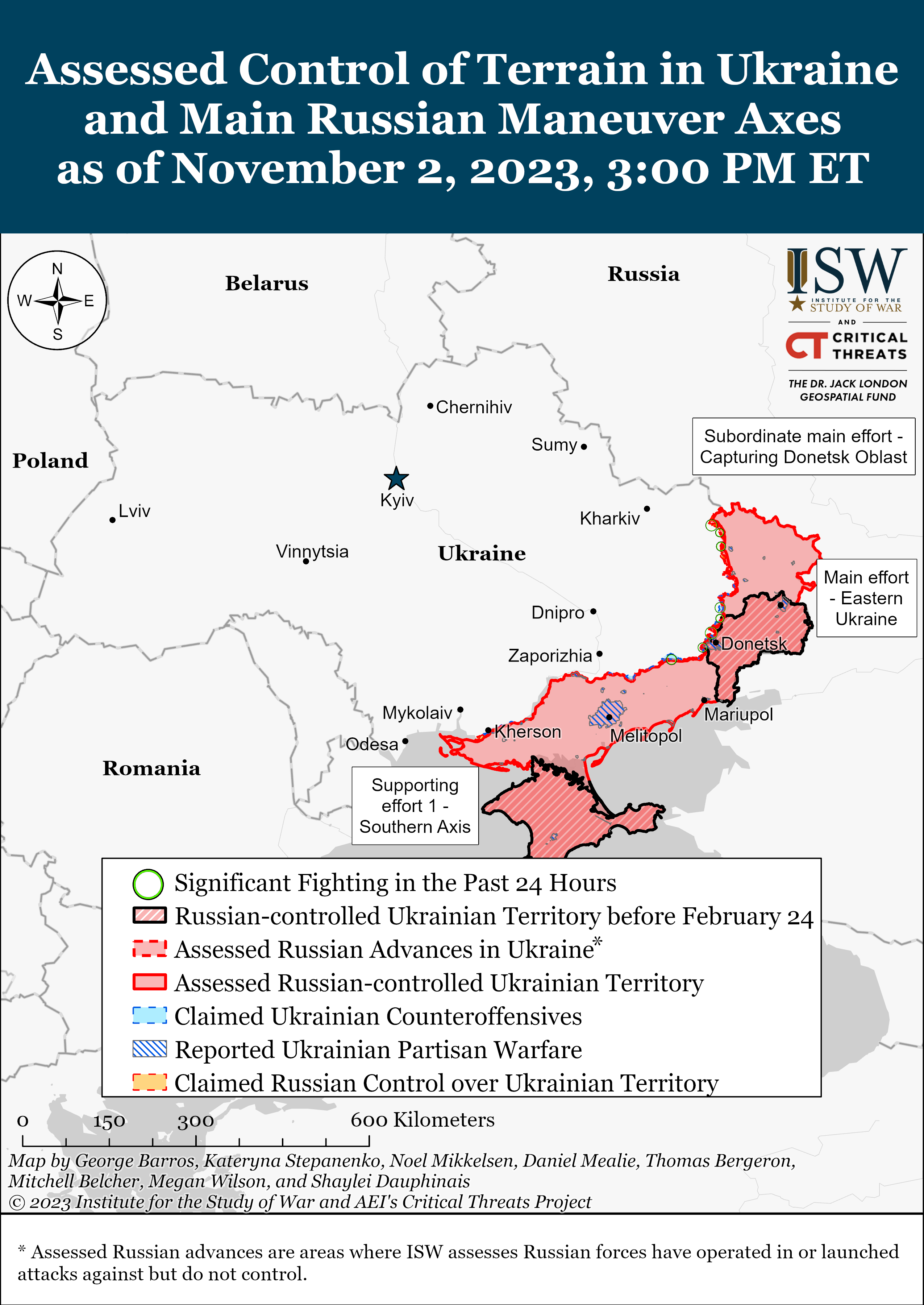
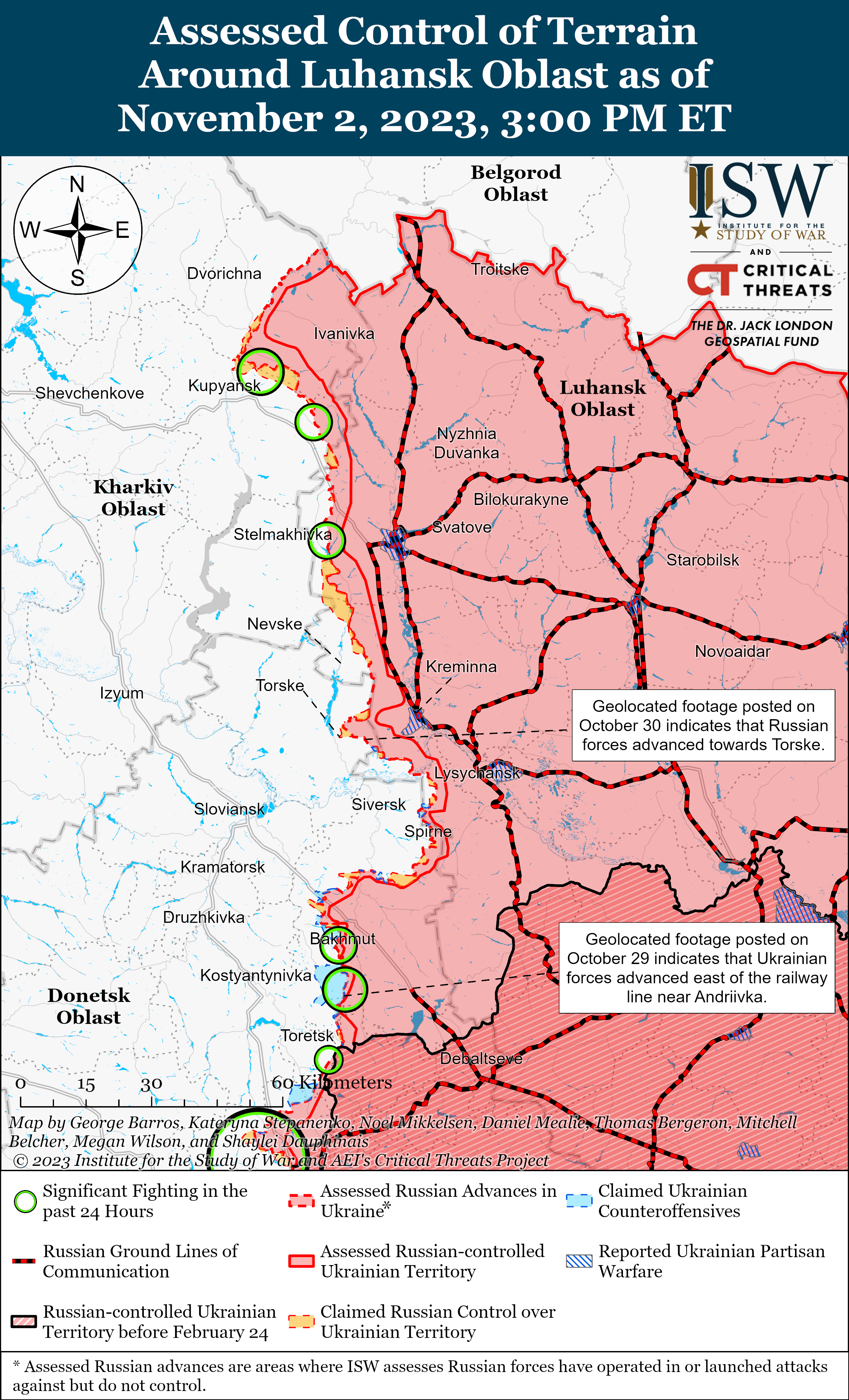
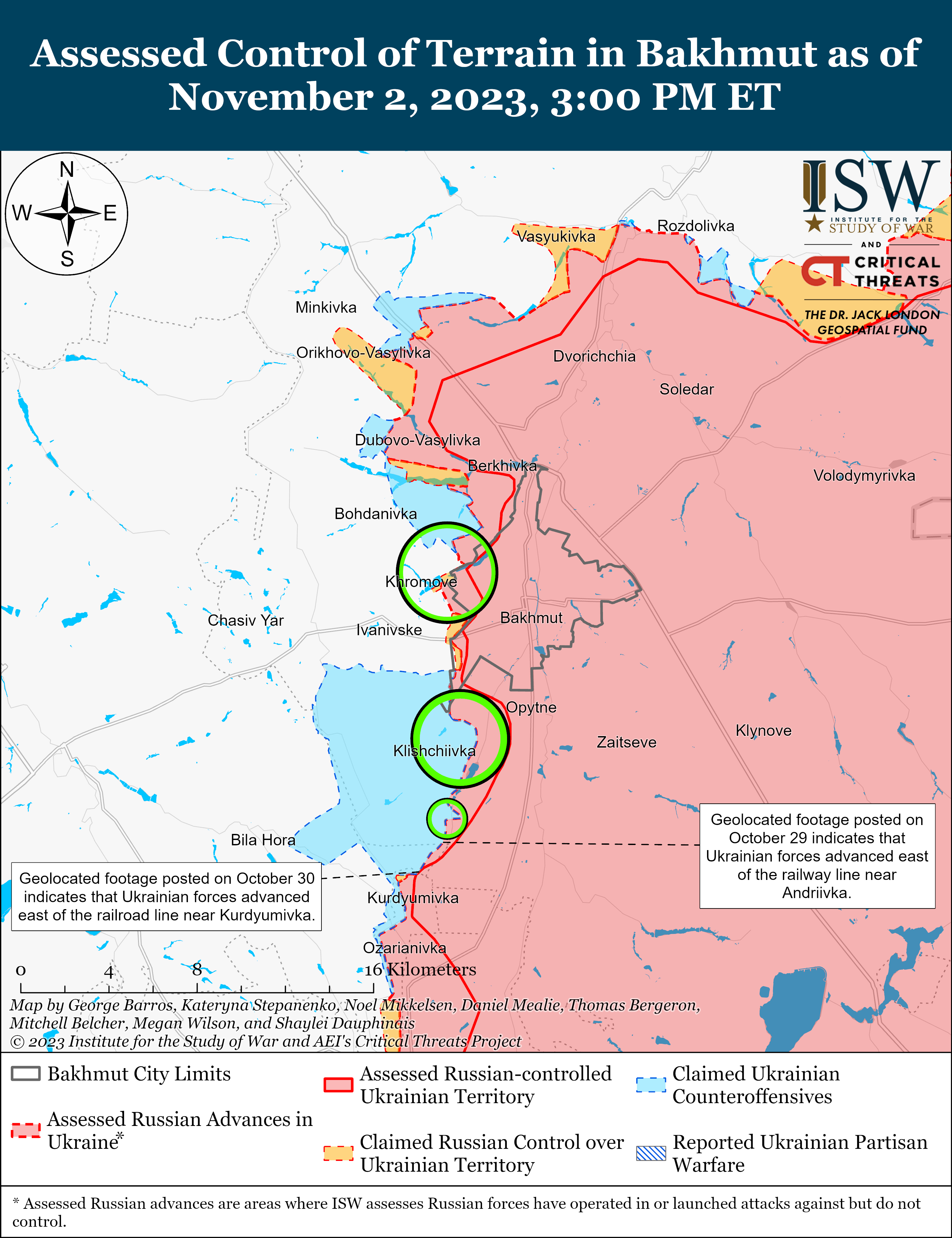
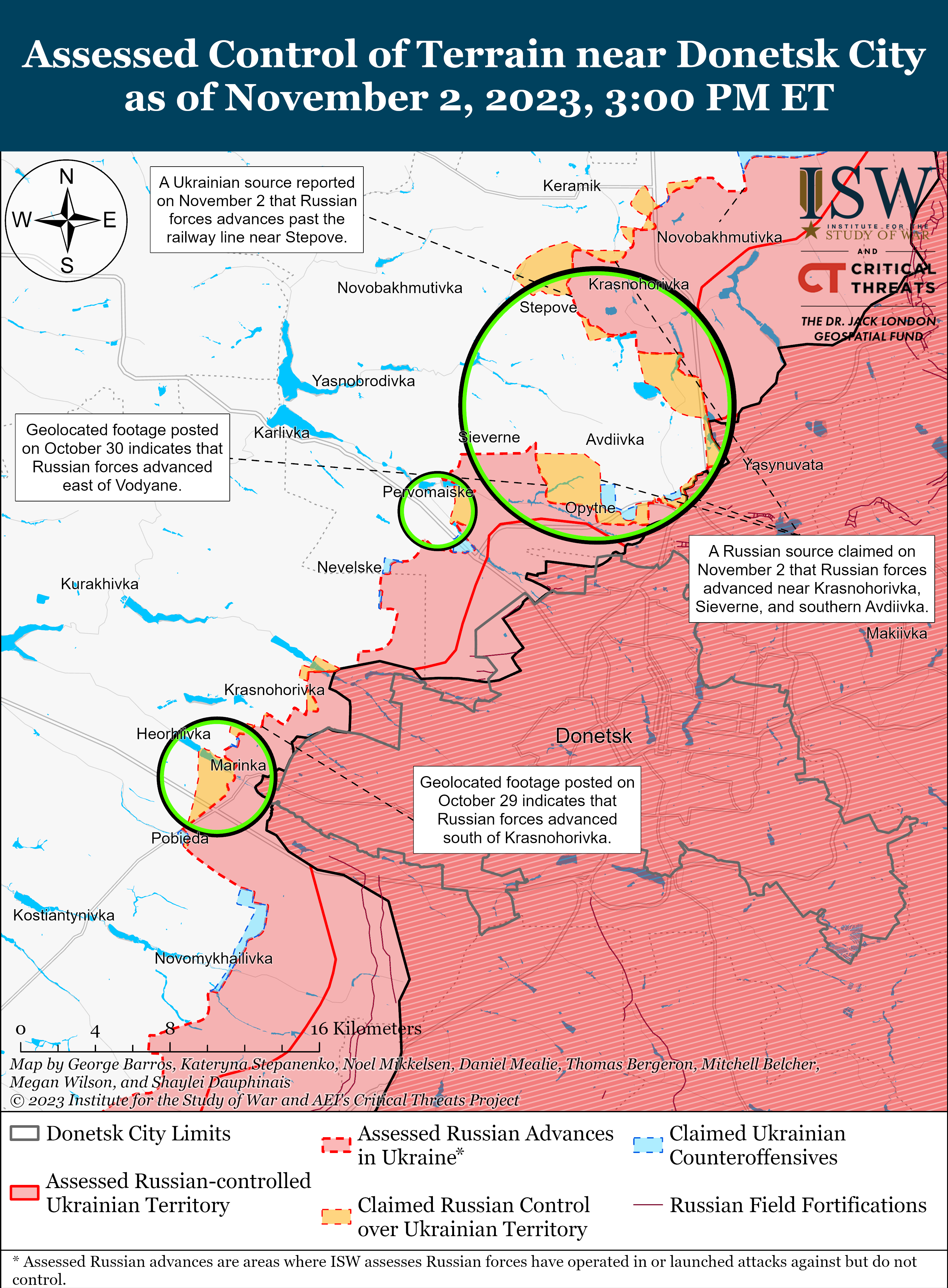
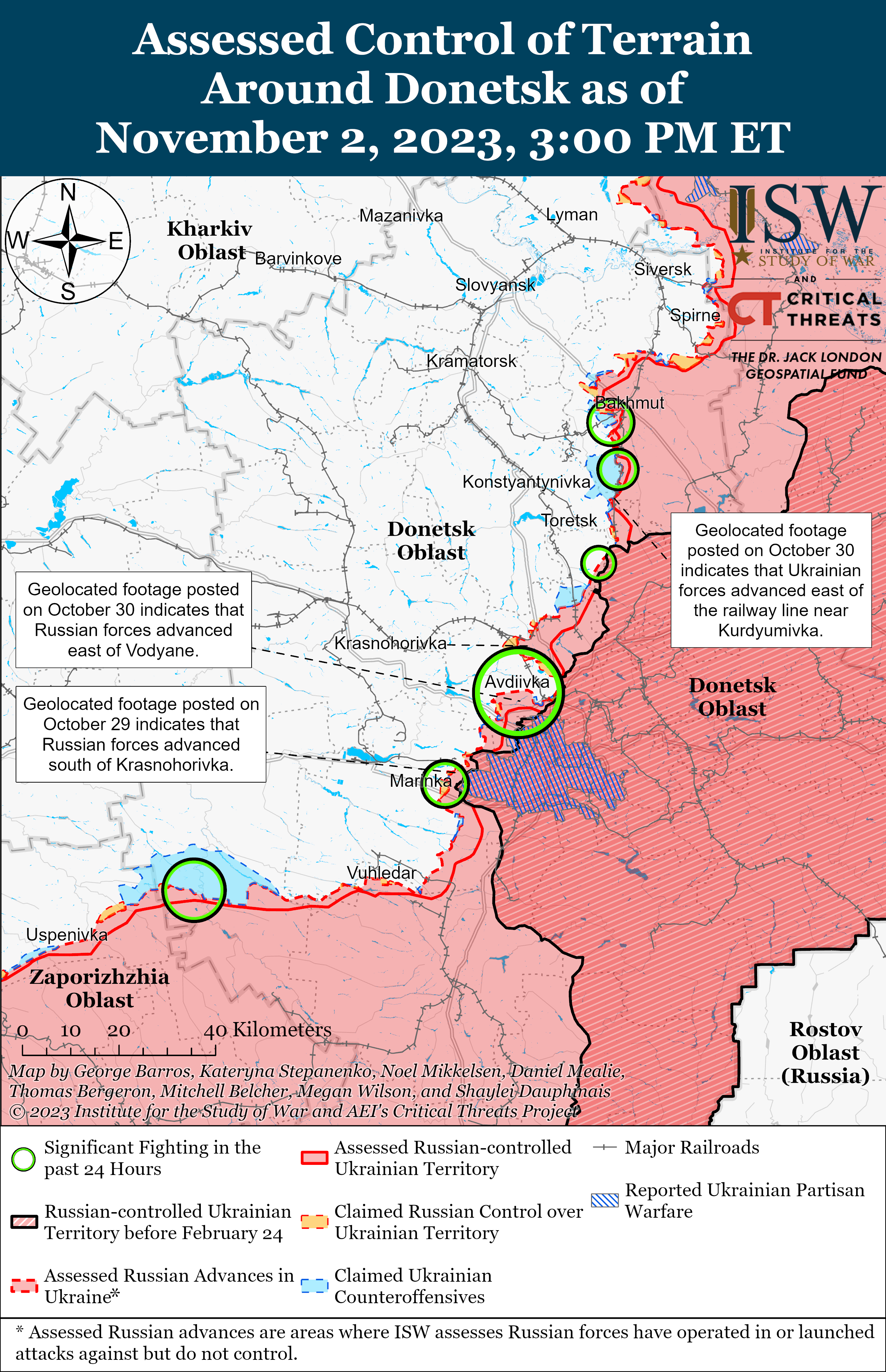
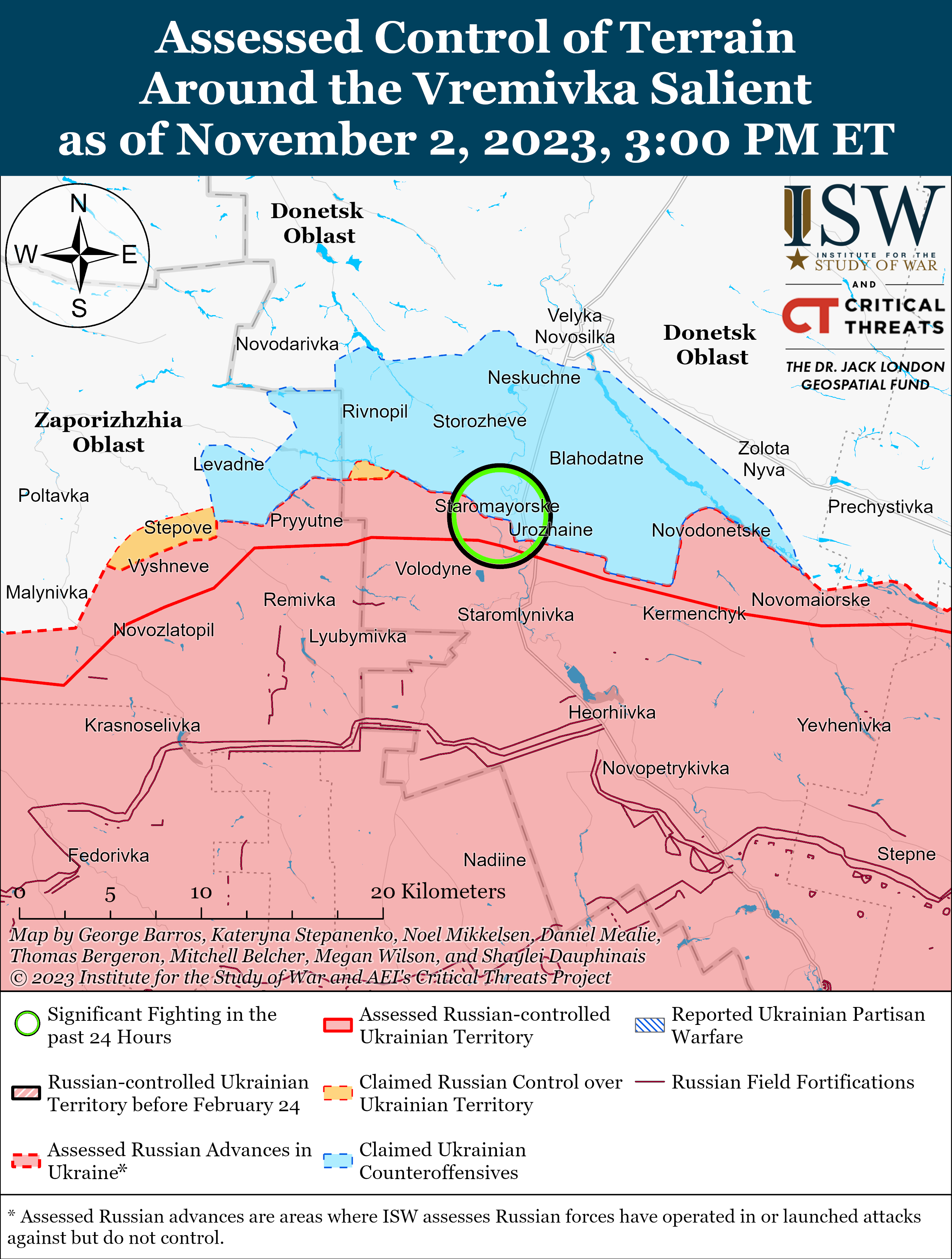

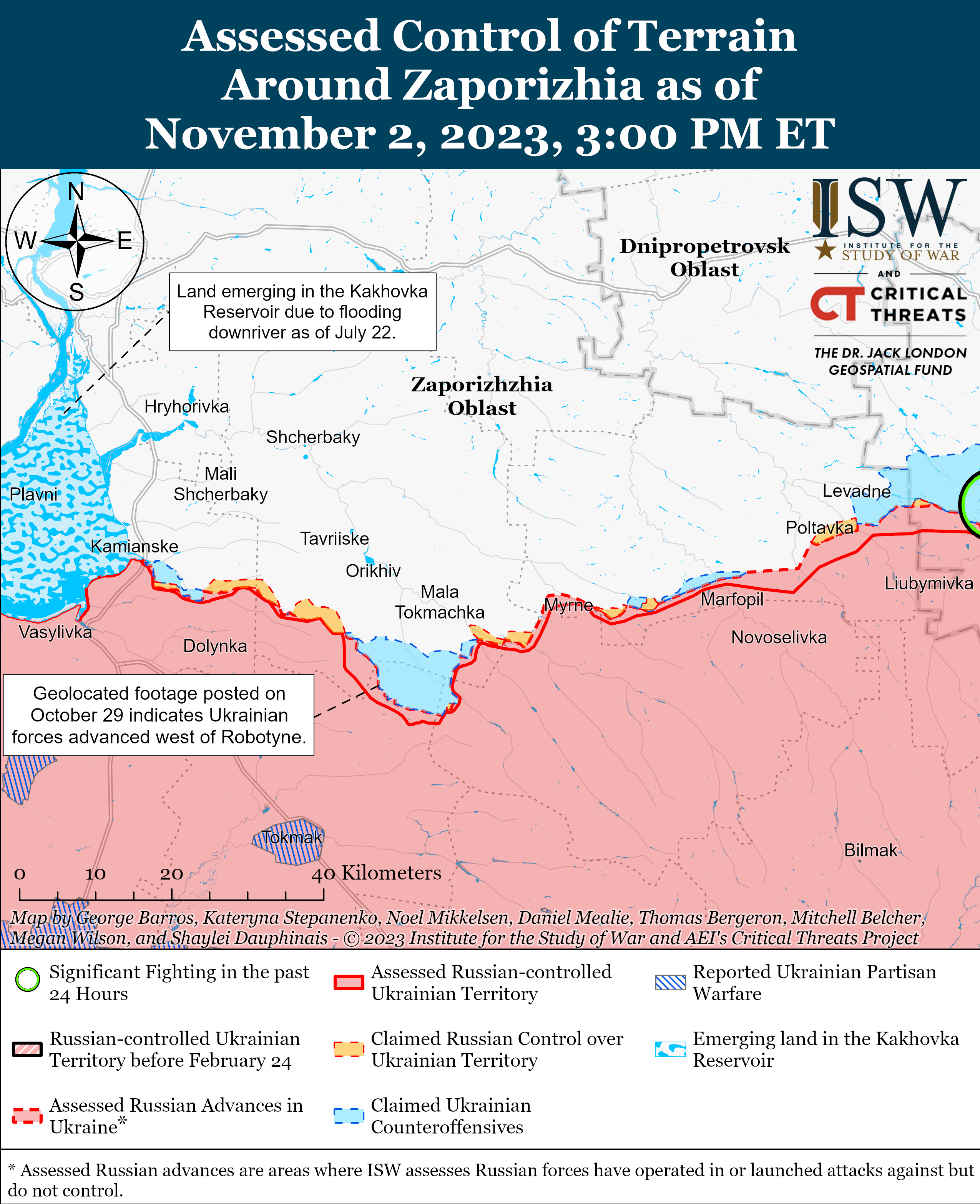
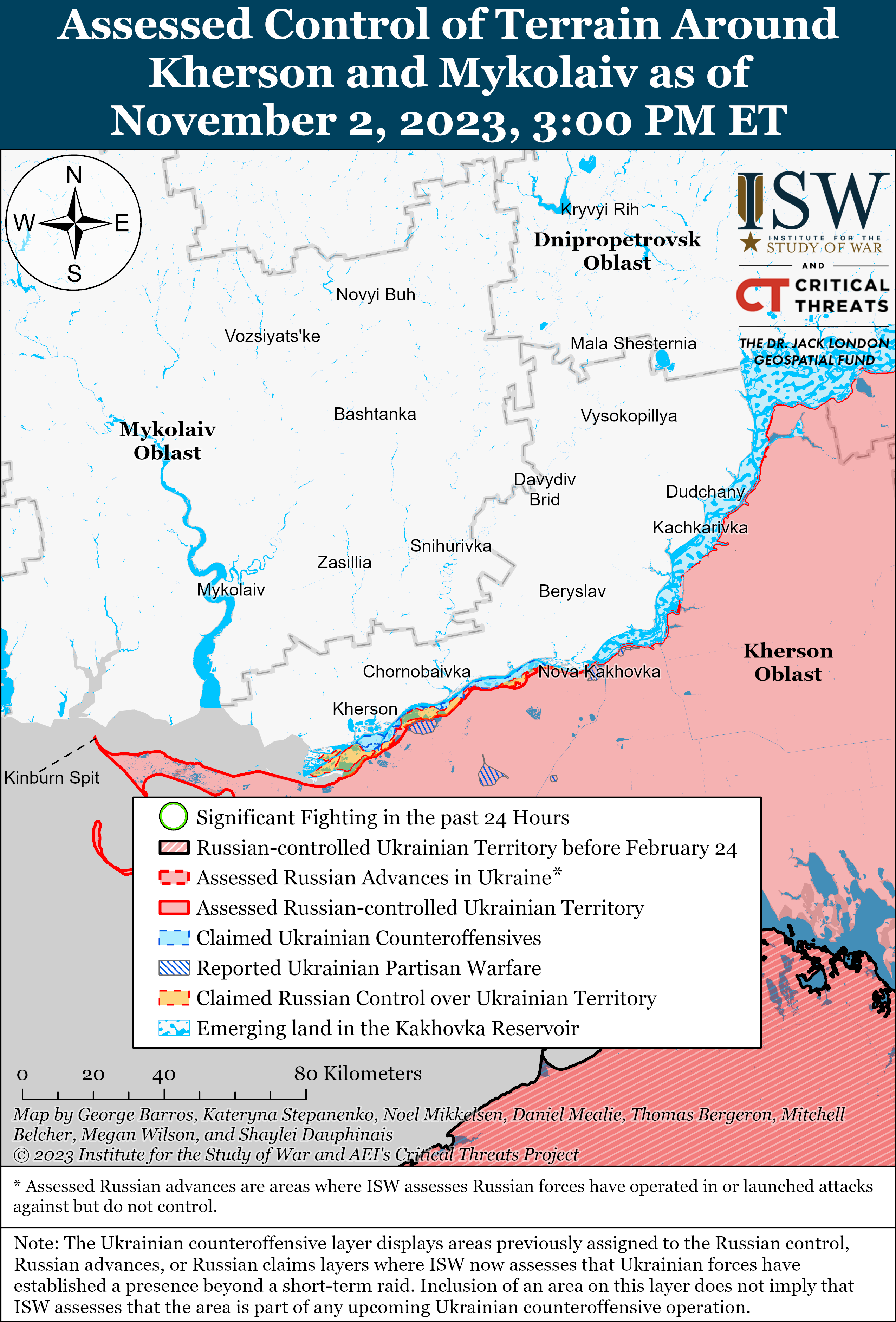
No comments:
Post a Comment